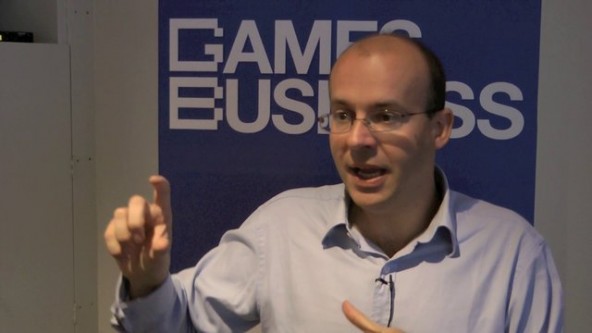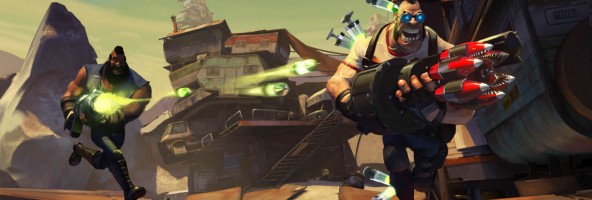Doing Free-to-Play Right: An Expert's View
When it comes right down to it, I'm just a guy. I say things, things that I think are right, but it's not like anyone is busting down my door to hire me to help them make their free-to-play games (not yet, anyway).
So it's refreshing to see someone who is routinely hired to help people make their F2P games espouse some of the same principles that I – and many others with the same “I think I know what I'm talking about but I'm not sure” attitude – have come up with regarding F2P acquisition, retention, and monetization.
Nicholas Lovell, who has literally written the book on F2P monetization, gave a talk at GDC Next 2013, which you can find here. It's long, and some of his higher concepts went over my head, but several of his talking points are spot-on with what many feel is the “right” way to do F2P. Much of his talk revolves around the mobile gaming market, but he has plenty of examples in the PC and console gaming space, as well.
Here are a couple of his most interesting points:
People should be able to play nearly an entire game for free. Here's the key stat I perked up on from this part of Lovell's talk: 70% of players who finished Candy Crush Saga were free players. First, I didn't know you could “finish” Candy Crush Saga. So if nothing else, I learned that much.
The next time you hear someone with a subscription-model game throw up their hands and say they just have no idea how they'll make money by making their game “free,” remind them that King is estimated to make around $800,000 per day from CCS.
Obviously, King isn't exactly known for their friendly business practices these days – a fact largely unknown to Lovell when he gave his talk last year – but the same concept applies to games like World of Tanks (which has 70% to 80% free players) and League of Legends. It seems contradictory, but you can make money with a game you give away for free. It's a proven fact, and arguments to the contrary are just companies trying to hook you on a sales pitch on their aging subscription model.
Retention is far more important in F2P than in P2P. If you buy a $60 game and play it for 30 minutes and hate it, the company that made it might be a little unhappy, but they've already got your money, so it's no big deal, accounting-wise.
If you pick up a F2P game and abandon it after 30 minutes, the developer probably got nothing out of you. Thus, F2P games must work harder to “hook” you on the initial gameplay and, importantly, get you into the game faster and provide what Lovell calls a “meaningful experience” quickly to retain you and get you to spend money.
This is a bit of a double-edged sword. Let's face it: Many F2P games feature shallow, uninteresting gameplay that still manages to “hook” players because they're easy to figure out and borderline addictive (see Flappy Bird). They figure that if they remove those pesky barriers to entry like, say, having to figure out a complex bunch of systems or, most importantly, handing over your credit card info, they'll get you in quicker. On the other hand, games that are, at their core, simple, like an FPS (grab gun, shoot bad guy, repeat), can draw players in quickly with their accessibility and keep them around with their depth.
It's no surprise that F2P games that follow the typical “grind for hours before getting to the endgame” model (especially MMOs) tend to lose their luster and appeal rather quickly while games that are essentially the same from start to finish (like most PvP games) have a much longer shelf life. Games that let players enjoy the core experience right out of the gate have a better chance of hooking and retaining players than ones that require a long lead time before you get to the “fun stuff.”
That guy in World of Tanks. Seriously, even if you don't want to watch the whole video, you have to hear Lovell's incredible description of a (possibly apocryphal) World of Tanks players who hates dying so much... well, check it out for yourself. The story starts at 35:40.
Anyway, if you have an hour or so to spare, give Lovell's talk a try. You might have to pause it occasionally to consider some things, as I did, but it's an interesting look into the mind of someone who knows more about this stuff – and isn't trying to sell you on a concept – than any of us.
About the Author

Jason Winter is a veteran gaming journalist, he brings a wide range of experience to MMOBomb, including two years with Beckett Media where he served as the editor of the leading gaming magazine Massive Online Gamer. He has also written professionally for several gaming websites.
More Stories by Jason WinterRead Next

It's time to fill out your bracket – no, not for basketball, for video games!...
You May Enjoy

These five titles should be on the radar for any MMO fan.

It looks like players are in for a busy January.

And they’re all looking for your votes.

The trip to Lahai-Roi is worth it.



Most companies like to play with illusions, that your cash is doing some thing magical online to protect you. Sadly, that is a lie. I have been in private server communities for years. I have had no problems where as my new Guild Wars 2 account is compromised in 2 days.
Private servers put cash shop items in an npc shop to be purchased with in game coin. They only ask for donations based on your fun. They stay active and people give monthly donations because they know supporting fun is better than "pay this because we are X brand". And the companies know it and are running scared. Look at the last updates.
All updates companies are doing are trying to fight the private servers. WoW, instant end game character for 60 bucks. Webzen did this, and other titles to "entice new players".
They release all these excuses and reasons why they are doing it to calm the sheeple: "It is because we find that blahblahblah" Damage control. The fact is, they are losing people who are having better experiences for free.
Really. Nuff said. The rest is just propaganda. "Oh, private servers are hackers " blah blah fear fear.
Hackers are your friend. If it was not or "hackers" like Napster, the system would still have us use CD's only. No digitial MP3s allowed. Napster forced the entire market to change, and Itunes was born and other enterprises. And in the end, .99 cents a song = bigger profits than CD purchases, especially when you can cut out the plastic used to make the CD. Thank you hackers. Thank you very much for evolving humanity.
The hackers that "steal your information" usually can be traced to the same company taking your credit card information. DERP.
1. super fans - they are 40% of the total revenue and spend over $1000 each. even in a pay to save time game, at those numbers a definite advantage can be gained.
2. freeloaders - the players who simply exist. these players rarely care about the game itself and are usually only there for a) free stuff from a super fan or b) only there for a short time or c) there to create trouble - now c = good for the devs because when trouble starts super fans pay to win.
games like LoL, Dota etc are pretty much exceptions to his rule set. why? because they aren't real mmos. session based games take less money to create and less money to operate. phone apps are big with devs because of the same reasons. they make tons of money since development and operation costs are minimal.
so if you are an open world mmo player you wont see those same results. you will see superfans, and tons of freeloaders. and since a good open world mmo costs a lot of money to develop you will likely see less content/engaging experiences.
people have been saying subs are dying for years as if they say it enough it will eventually become true. yet year after year the big mmos launch as pay to play due to monetary restrictions and the fact that there are still enough players who realize what f2p comes with.
good read Jason and nice vid. thanks for the link